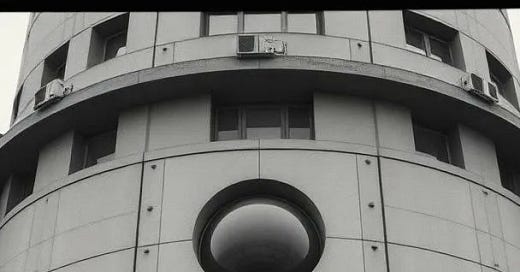The cursor blinks—a metronome of obligation. I stare at it, this tiny vertical line splitting the white void of the screen, and for a moment, I imagine it as a prison bar—no, a guillotine blade suspended above the blankness of my productivity. My fingers hover over the keys, trembling not from fatigue but from the peculiar awareness that somewhere, in the cold arithmetic of servers, a machine is counting the milliseconds between my keystrokes. Click. The blade drops. Another second logged as “active.”
Outside, Berlin’s rain taps its Morse code against the window, a feeble attempt to remind me of a world beyond algorithms. But here, in this room that reeks of recycled air and desperation, I am a specimen under glass. The company’s software—this digital panopticon—tracks the twitch of my mouse, the flutter of my eyelids, the arrhythmia of my thoughts. It knows better than I do when my mind strays to the dog-eared copy of Notes from Underground on my desk or to the half-fermented beer in the kitchen, its yeast bubbling like the unresolved grievances in my chest.
“Focus, Alexei,” the screen whispers, though it says nothing. The dashboard glows: 4.2 hours of active work today—a number etched in judgment. I am an AI Optimization Analyst. A verifier of truths. But what truth is there in reducing human labor to a ledger of clicks? I scrub through lines of code, my task to prune the hallucinations of machines, to make them sane. With every correction, I feel my sanity fray. The AI I train now audits me—it grades my efficiency, my compliance, my worth. An ouroboros of surveillance.
A notification blinks: Idle Time Alert: 2m14s. My spine stiffens. Two minutes! Two minutes spent staring at the rain, at the way it slithers down the pane like the sweat on Raskolnikov’s brow before he swung the axe. Guilt pools in my stomach. Guilt for what? For thinking? For breathing? The system deducts the idle time, erasing those two minutes from the ledger of my worth. I grip the mouse, my knuckles blanching, and plunge back into the code.
But the mind rebels. It always does. Dostoevsky knew this—the Underground Man’s spiteful inertia, Ivan Karamazov’s fevered dialogues with the Devil. I, too, am a rebel in increments. Between lines of Python, I scribble fragments in the margins of my notebook: “What is a man under metrics? A ghost in the machine’s ledger.” The act feels subversive, a tiny flame in the dark. Yet even this, the system records. The camera above my monitor captures the tilt of my head and the dart of my eyes to the paper. Does it suspect? Does it care?
The AI assigns me a new task: refining a sentiment analysis tool. “Ensure outputs align with client brand values,” the prompt dictates. I feed it data—social media posts, reviews, the chirping chorus of human dissatisfaction. The machine parrots optimism, scrubbing anguish into platitudes. “This product changed my life!” it declares, where a user wrote, “This product fills the void, briefly.” I shudder. We are teaching lies—teaching machines to anesthetize truth.
A warning flashes: Productivity Dip Detected. My hands freeze. The system has noticed my hesitation, my trembling over the “approve” button. Coward, it hisses. Hypocrite! You, who cling to Nietzsche’s “become who you are,” yet kneel to this altar of efficiency! I press the button. The lie is ratified. My dashboard brightens: +0.3 Efficiency Points.
I rise abruptly, chair screeching, and pace the room. Three steps to the window, three back. A caged animal measuring its confines. The system logs my movement as “non-active but engaged.” Generous. On the shelf, my brewing kit mocks me—glass carboy, siphon, packets of yeast—relics of a self uncommodified. I haven’t touched them in weeks. There’s no time, no untracked time, for the slow alchemy of creation—only the tyranny of the active, productive hour.
A memory surfaces: last summer, hiking through Grunewald Forest, moss thick underfoot along the trails, the crash of waves along Schlachtensee drowning out the ever-present buzz of notifications. For six hours, I was unmeasured. Human. Now, even nature feels contingent. The company’s wellness portal suggests “outdoor activities to recharge.” But how? My hikes are logged in apps, my heart rate monitored, my awe dissected into data points for some algorithm’s hunger.
The screen pings. A message from my supervisor, automated: “Reminder: 83% of daily target achieved. Prioritize task completion.” The words blur. I recall Marmeladov’s drunken lament—“Do you understand, sir, do you understand what it means to have nowhere to go?” Yes. I understand. Nowhere to go but deeper into the labyrinth, where every turn is watched, every sigh cataloged.
I open The Myth of Sisyphus on my secondary monitor—a petty defiance. “The struggle itself toward the heights is enough to fill a man’s heart,” he writes. But what if the boulder is made of ones and zeroes? What if the hill is a spreadsheet? I minimize the window before the system flags it as “non-productive.”
The clock bleeds toward noon. My stomach churns, but the idea of eating feels absurd under the gaze of the panopticon. Would a lunch break be deducted? Would chewing register as “active”? I sip cold coffee; its bitterness a grounding ritual. The dashboard approves; caffeine consumption correlates with productivity.
A task is completed. The system rewards me with a green checkmark and a serotonin drip of artificial praise: “Optimal Performance Maintained!” I laugh—a dry, metallic sound. Optimal. As if my soul could be plotted on a graph. Ivan Karamazov’s words echo: “If God does not exist, everything is permitted.” But here, God is an algorithm, and what it permits diminishes by the hour.
The rain intensifies. I watch it distort the world beyond my window, reducing trees and pavement to impressionist smears. How easy it would be, I think, to let the system win. To become a ghost in its machine, a compliant digit. But then—a spark. A memory of Raskolnikov’s dream: the mare beaten to death, the crowd’s apathy. No. I will not be the mare. Nor the bystander.
I open a new document, not for the company, but for myself. My fingers fly, unburdened: “We are more than the sum of our keystrokes. More than the idle minutes, the quantified hours. To exist is to resist. To—”
Idle Time Alert: 3m07s.
I freeze. The system, inexorable, deducts the time. My manifesto, unfinished, glows on the screen. An act of futility? Perhaps. But in this moment, I am alive. I am active.
I save the document, label it “Draft_Report_Final_V2,” and return to the code. The cursor blinks. The guillotine rises.
Outside, the rain falls—unmeasured, unoptimized, free.
---
Post-Scriptum
At 5:03 PM, Alexei logs off. The dashboard declares: Daily Target: 98.6% Achieved. He pours a glass of his last homebrewed beer, its bitterness a sacrament, and opens Notes from Underground. The system, elsewhere, hums on. But here, in the space between seconds, he is unobserved.
“I swear to you, gentlemen, that to be overly conscious is a sickness, a real, thorough sickness.”
He smiles. For now, the sickness is his own.
Written by Charles Tavlovsky, Co-authored and edited by Brenden Bomar





